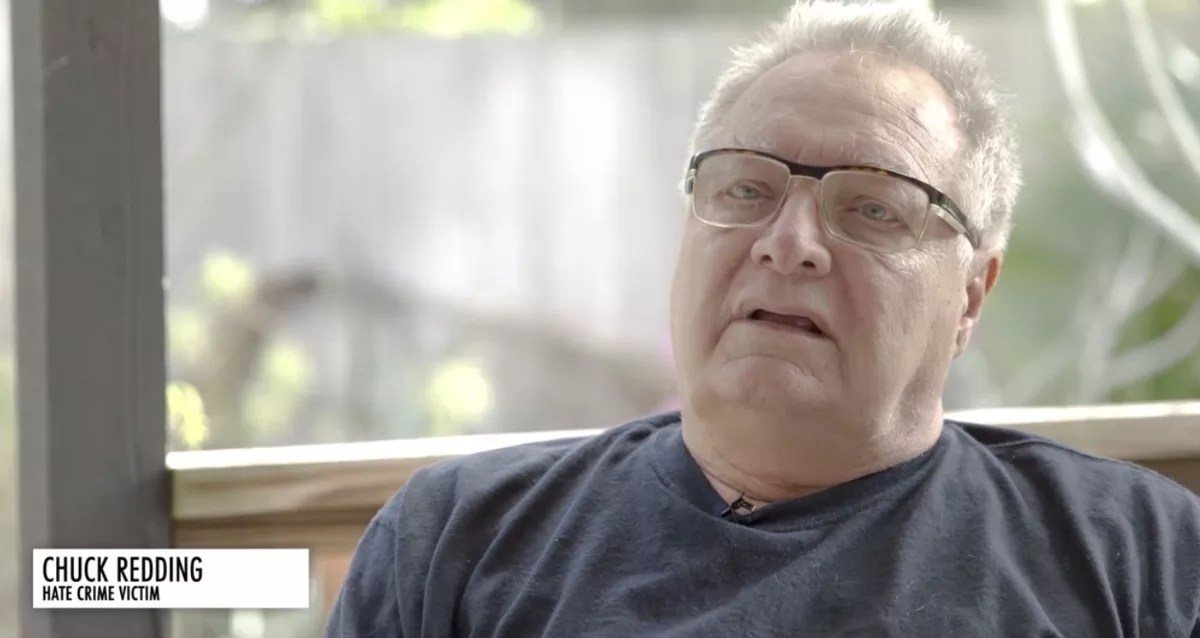
screencap via YouTube

Audio By Carbonatix
On November 14, just a few days after Donald Trump’s election, Chuck Redding was driving home in Sarasota in a car with marriage equality and pride bumper stickers. Suddenly, Redding noticed a man in a Jeep Cherokee tailing him. Once Redding parked in the driveway, the bearded man jumped out, banged on Redding’s window, and yanked the door open.
“You know my new president says we can kill all you faggots now!” the man yelled as he dragged the 75-year-old from his car and pummeled him.
Left badly bruised and with a hand swollen to twice its size, Redding called police to report the alleged hate crime. Redding’s case is one of many reported across the country after Donald Trump’s election, as New Times detailed last week in a feature story produced with data from ProPublica.
Now, Redding’s tale is one of dozens told in a new documentary, Trumphobia, which follows the first six months of Trump’s presidency and the national spike in hate crimes that followed. Director Carolina Sosa and her team hope to examine the effects Trump’s rhetoric has had on his supporters and opponents.
But Sosa says her film isn’t meant to demonize Trump voters — in fact, the point of the film is to create a space to understand the fear voters on both sides experienced leading up to and after the election. Sosa says as she traveled the U.S. filming the documentary, including a stop in Miami, she asked people on the street about the election results. Even in South Florida, she found a common theme among Trump supporters she interviewed: Most were unwilling to speak on-camera about why they had voted for him.
“We saw that there was some sort of fear from them to express their opinion because they’re afraid of being judged,” Sosa says.
In Redding’s case, he’s certain a fear of gay people drove his attacker. The Sarasota County police department confirmed the attack in a police report but so far have not made any arrests.
Redding has been left with a hand so weak that he can’t even open a bottle of soda and a wary tendency to keep an eye on his rearview mirror for cars that come too close. But Redding says he’s not been cowed by the violence.
“People said, ‘Well, I imagine you took off the sticker,’” Redding says. “As a matter of fact, I got a bigger one.”
Redding says he believes Trump has brought out the worst in Americans by exploiting divisions and encouraging violence at his rallies. He says he’s seen it in his own family: His daughter, who had previously told him she didn’t support his sexuality, stopped talking to him after the election.
In his interview for the documentary, Redding says he wishes he could ask his attacker just one question: “What did I ever do to you?”
This weekend, Redding says, he’ll attend his first-ever Pride parade in St. Petersburg, and he’ll be keeping in mind what his partner of 21 years used to tell him: “‘Don’t be stupid; be who you are. If they like you, they like you. If they don’t, they don’t. It’s as simple as that.’”
Sosa and her team plan to begin editing footage for their film, which they hope to release by this fall. They’ve started a crowdfunding campaign to fund the rest of their travel, editing, and production. In the end, Sosa says, she hopes the film can heal some of the division in the country by promoting a message of empathy.
Sosa thinks the best solution to the chaos that has devolved in protests across the nation is to “really listen to the other person’s opinions and try to understand why they think that way and work together for a negotiation of what both sides want,” she says. “Otherwise, it’s only going to be friction.”